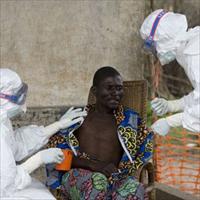DRC-UGANDA: Ebola outbreak leads to border closure

Health authorities in the Democratic Republic of Congo (DRC) have closed the lake and land border with Uganda and shut down two markets as a precautionary measure to prevent the spread of Ebola from its neighbour.
Several dozen traders in the areas of Beni and Butembo in DRC's North Kivu province have been placed under quarantine after visiting Uganda. The Ebola virus has an incubation period of 21 days.
"We closed the border five days ago and also shut two markets - Kasindi and Watakingi - where traders coming from Uganda sell their merchandise," said Marcel Katembo, the officer in charge of public health in Beni and Butembo.
An outbreak of Ebola in the western Ugandan district of Bundibugyo has claimed the lives of 28 out of 112 people infected since September, and sparked fear among the population.
Katembo said checkpoints had also been set up along the roads to DRC towns and villages. The measures have led to the blocking of about 30 lorries carrying food and other supplies, and there are fears the prices of essential supplies could rise as a result, according to a report on Radio Okapi, which is supported by the UN Mission in Congo (MONUC).
Local civil and health authorities, as well as radio and television services, are conducting an Ebola awareness campaign in the border areas.
An Ebola outbreak that claimed the lives of nearly 20 of the 26 people infected in the Kasai Occidental province of DRC was declared to have ended in November.
Ebola is characterised by fever, diarrhoea, severe blood loss and intense fatigue. It is transmitted through direct contact with the bodily fluids of infected persons or primates. There is no cure, and health experts say between 50 and 90 percent of victims die. The best way of halting its spread is through prevention, prompt detection and the isolation of suspected cases.
The DRC experienced Ebola epidemics in 1976 in Yambuku, Orientale province, in Kikwit, Bandundu, in 1995, where at least 250 deaths were reported, and in Watsa, Orientale, in 1999. In Uganda, an outbreak killed at least 170 people in the northern Gulu district in 2000.
The Ebola virus was first identified in 1976 in Sudan and in a nearby region of DRC, then Zaire. Outbreaks have also occurred in Côte d'Ivoire and Gabon.
See Also
- Best Teeth Whitening Will Enable You To Get Desired Effects
- UGANDA-DRC: Ebola under control but experts fear re-emergence in Congo
- Health organisations respond to Ebola outbreak in Democratic Republic of the Congo
- DRC: Outbreak in Kasai Occidental confirmed as Ebola
- DRC: Ebola outbreak "contained" - Kabila
 Back and Next - Back and Next
Back and Next - Back and Next See Also - See Also
See Also - See Also